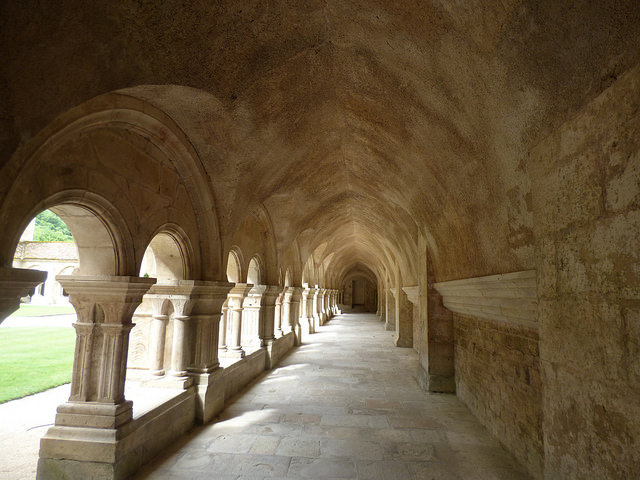
Monastic Focus
Focus is an essential aspect of leadership. We expect leaders to focus in certain ways on specific things.
Many of the leaders I know focus on one thing after another with sustained intensity. They shine the focused beam of their attention on each question in its turn.
Learning how to focus is not a challenge for these leaders. The challenge for them is knowing where to focus when.
Being able to focus is one of my own primary personal strengths. My tendency is to rely on focusing by default, possibly more than is healthy or necessary.
I have learned to try new and different approaches to focusing. One of the skills I needed to learn was how not to cross-examine people. It is not always helpful to flip the switch from unfocused to the high beams so quickly.
Not every conversation needs to be a staring contest to find out who will blink first.
Learning to focus helps us pay attention. Sometimes it is helpful to listen and pay attention without being too obvious about it.
I am finding my monastic focus.
When I spend time with monks it rarely feels like I am being interrogated. The monks I know are able to pay attention without becoming so aggressively focused.
Monks ask good, insightful questions and pay attention to the responses they receive. Part of monastic focus is listening to what lies beneath, under the surface of someone’s words.
Monks are focused without seeming to try to catch someone in an inconsistency. They listen and ask questions, as well as using their sense of humor.
Monastic focus has a different perspective than we often have as leaders.
Too Tightly Focused?
There have been times in my life when I was more tightly focused than was healthy.
Setting and achieving goals has been motivational for me longer than I can remember. I decided I wanted to become a lawyer when I was in elementary school. My focus was strong and I never really wavered from my goal.
After college and law school I looked for a job where I could learn how to practice law. I became a criminal prosecutor and gained valuable experience. That was my first opportunity to understand practicing law from the inside out.
Going to court as a trial lawyer fit my extrovert, thinker personality. I enjoyed what I was doing and believed I was doing some good.
As I gained experience I also gained insight. Questions came to me I had not considered as an elementary school student. Life, and justice, were more complex than choosing between guilty and not guilty.
My questions did not weaken my focus. They helped me shine its light into new areas.
I began to understand my questions were at least as important as winning my cases.
My focus had become wider with a larger perspective. It was one thing to ask cross-examination questions and draw information from a witness. There was an entirely different focus to the questions which were emerging within me.
I had approached life like it was a witness I was questioning. My focus was on nailing down specifics and proving my positions were valid.
As a leader, I relied on the power of setting and achieving goals. One step at a time I would persuade people to move forward. Like a well-crafted legal argument, we would accomplish each objective until we reached our goal.
There was always another goal.
Finding Our Monastic Focus
I began to explore and discover some more contemplative practices. They appeared to be based, not in achieving goals, but in being open to the life around us.
With help from my friends my exploration of contemplative life led me to meet monks.
The monks I met were not the vague idealists I had expected them to be. They were practical, accessible men and women who struggled with significant challenges. Some of them were asking the same kind of questions I was asking.
The monks I met appeared to be more open to questions than many of the leaders I knew. Their focus was different.
Monks were not really interested in controlling measured bits of life or of the truth. Their questions were more about Why? than about How?
Monastic focus encompasses more than the point of focus we often see.
It is not that the monks I know are unfocused. I have heard monastic focus described as diffused focus or unfocused attention. That may not do justice to the focused monks I know.
The leaders who inspire me with the power of their focus are not myopic. They focus on more than the particular points on the chart or in the process. It is important for them to take in the reasons things work the way they do.
They understand leadership cannot be evaluated solely based on what we can measure.
Monastic focus leaves room for reflection as well as analysis. There is more than just what meets the eye.
It is difficult for us to separate ourselves from our focus. We have been focused the way we are for as long as we can remember.
Walking Around and Taking a Look
Every so often we need to clear our minds, close our eyes, renew our focus.
We are so used to being focused all the time we need to take a step back, or a walk.
It is easy for us to believe we have life under control when we focus on what we can measure. Our focused staring tends to blind us to anything outside or underneath or beyond our focus.
It is not that we need to become unfocused, but we need to adjust our focus. We need to look again and see what we may have missed.
Taking a walk and looking around may help us see what our focus has been missing.
Where can we look today to find things outside our usual focus?
How will we find our monastic focus this week?
[Image by ell brown]
Greg Richardson is a spiritual life mentor and leadership coach in Southern California. He is a recovering attorney and university professor, and a lay Oblate with New Camaldoli Hermitage near Big Sur, California. Greg’s website is StrategicMonk.com, and his email address is [email protected].












